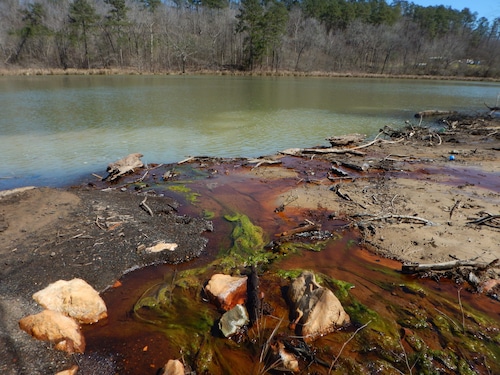A federal judge in Birmingham has approved a lawsuit settlement that will force the Drummond Company to clean up a leaking coal mine site along the Black Warrior River and pay $3.65 million.
Attorneys for Drummond and Black Warrior Riverkeeper agreed on the settlement earlier this year, more than five years after the Riverkeeper sued Drummond alleging violations of the Clean Water Act because of high levels of acidic discharge from the abandoned Maxine Mine into the Locust Fork of the Black Warrior River.
The mine, which closed in the 1980s, is located near the town of Praco in west Jefferson County.
“People who swim, fish, paddle, and boat in the Locust Fork and the Black Warrior River downstream and all the fish, turtles, mussels, and other wildlife are way overdue for this old coal mine cleanup,” Black Warrior Riverkeeper Nelson Brooke said in a news release. “Drummond now must move forward with significantly reducing their discharges of toxic metals, acidic water, and other pollutants into the lower Locust Fork.”
The Riverkeeper group says the acidic discharge entering the Locust Fork is coming from a 6 million cubic yard waste pile, that has released mine waste into the river without a permit since mining stopped in the 1980s.
Drummond Company did not immediately respond to requests for comment on Friday.
Black Warrior Riverkeeper was represented by attorneys from the Southern Environmental Law Center and Public Justice in the case.
U.S. District Court Judge Abdul Kallon formally approved the consent decree this week and ordered that its terms be implemented.
The settlement will force Drummond to remediate the old Maxine Mine site, which has been closed for decades, and to pay $2.65 million in legal fees for the environmental groups and $1 million toward supplemental environmental projects to improve the area.
Charles Scribner, executive director of Black Warrior Riverkeeper, told AL.com that the settlement shows the importance of the Clean Water Act, which allows citizens or environmental groups to sue polluters to enforce environmental laws.
“When the Clean Water Act was passed with bipartisan support 50 years ago, Congress recognized that government agencies would often fail to protect our nation’s vital waterways,” Scribner said. “After decades of government inaction at the Maxine Mine site, three nongovernmental organizations are holding Drummond accountable.”
But it did take time.
As required under the Act, the environmental groups filed a notice of intent to sue in June 2016, 90 days before filing their lawsuit in September of that year.
In May 2019, the U.S. District Court for the Northern District of Alabama ruled that the surface water discharges of acidic water contaminated with metals and other pollutants violated the Clean Water Act.
In January 2022, the court ruled that contaminated sub-surface discharges from the site into the river constitute illegal discharges of pollutants through groundwater in violation of the Clean Water Act.
In May 2022, the groups filed the proposed consent decree for approval after a 45-day comment period by the U.S. Department of Justice, and that decree was finalized this week.
“The finalized consent decree is a victory in fighting the long-lasting legacy of coal mining,” Jim Hecker, Director of Public Justice’s Environmental Enforcement Project said in a news release. “Companies like Drummond have a responsibility for cleaning up acid mine drainage and runoff that continue to threaten streams and groundwater in the watershed.
“Neither Drummond nor government agencies took any action to control the runoff after 1992.”
The agreement includes deadlines for clean-up operations that run from 2025 to 2027.
Barry Brock, director of the Southern Environmental Law Center’s Alabama office, said the case sets an important precedent for requiring cleanup of abandoned mine sites.
“The rulings in this case and the consent decree have set a precedent for polluters to take responsibility for violating federal law and harming Alabamians’ clean water,” Brock said in a news release. “The terms of this finalized consent decree will protect the Black Warrior River from harmful legacy impacts of coal mining.”
